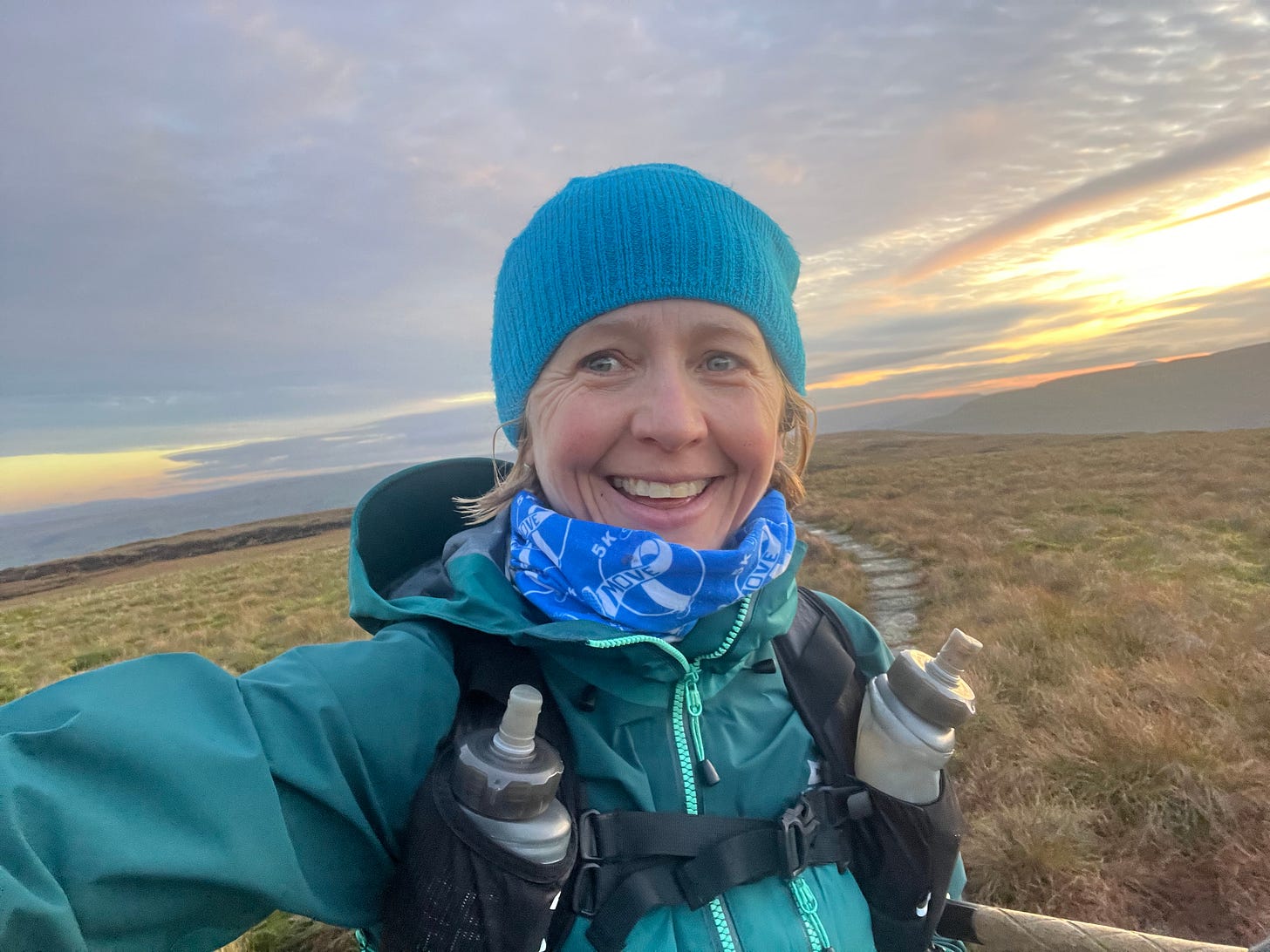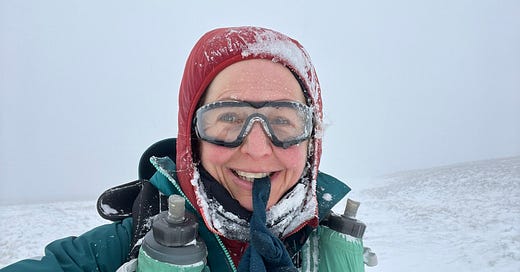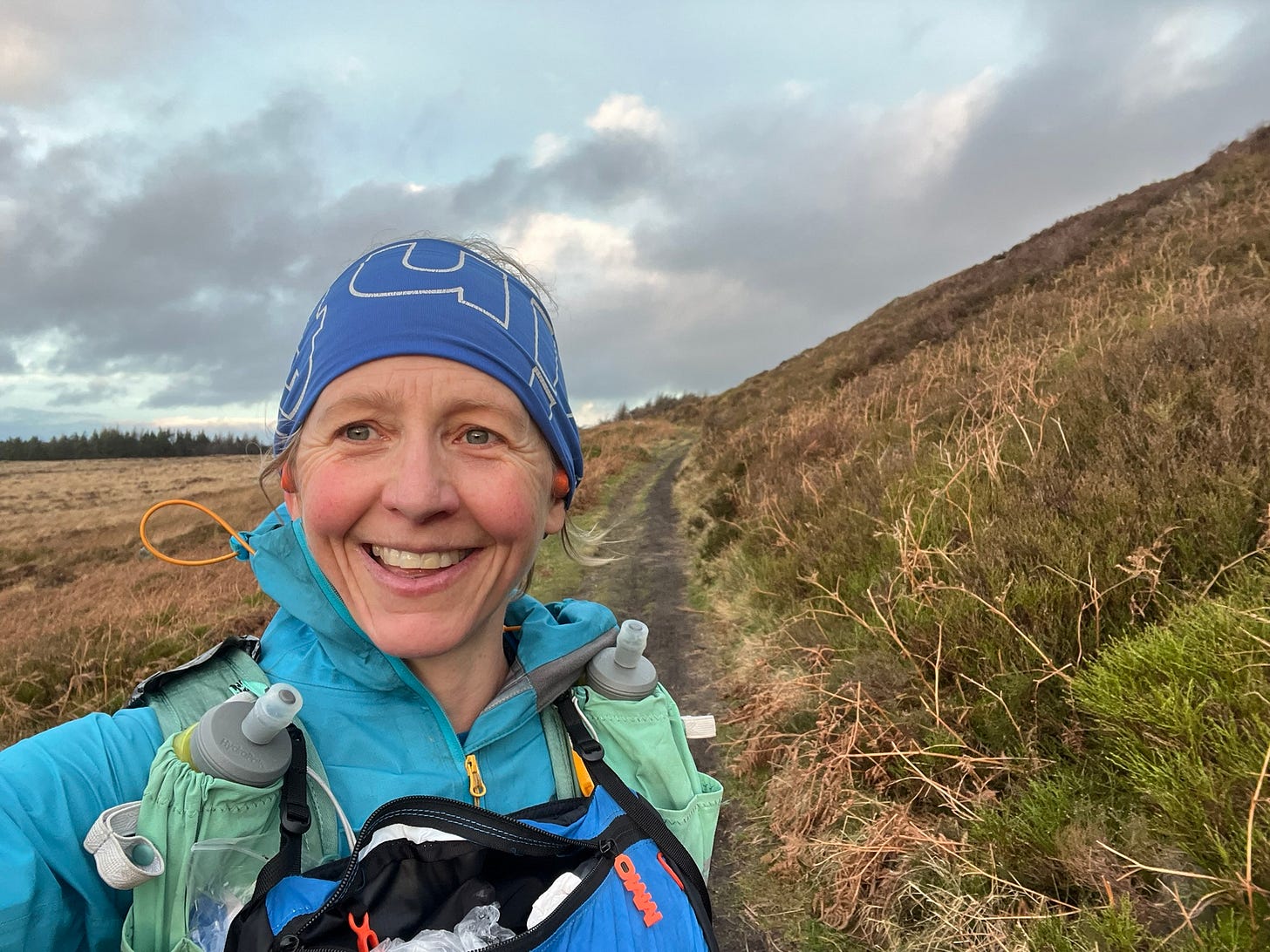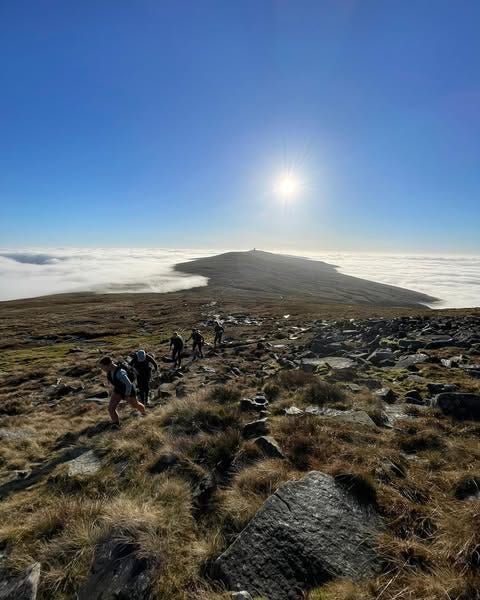Lucy Gossage: I want to reclaim the Spine Race for myself
Former pro triathlete Lucy Gossage on how a mid-race discovery led her to the startline of her second Spine Race and why she’s keen to revert a common misconception about her racing goals…
North-English weather is known for its adversity in all seasons, but January usually brings with it a host of extra special conditions – snow, storms, rain, gale-force wind with a sharp, icy bite… and sometimes all of the above at once.
The first month of the year has become synonymous in the trail-running world for the winter Spine Race, founded in 2012 by a polar-event organiser. In that inaugural event, just three out of the 15 entrants completed it.
The 2025 edition starts on January 12 in Edale, Derbyshire, in the heart of the Peak District National Park, and follows the Pennine Way 268 miles north to the Scottish Border village of Kirk Yetholm. Runners must carry their own sustenance and kit and they have 168 hours (seven days) to complete it.
The race has gathered momentum over the last decade and it now sees records regularly broken and outstanding performances and stories throughout the field. One of the notable tales from last year’s event was of Lucy Gossage, who raised over £31,000 for the charity she co-founded, Move Against Cancer, and this year she’s returning to the start line.
Of the 148 people who entered in 2024, Gossage – a former professional triathlete and a cancer doctor – was one of 75 who finished, coming 14th overall and the third woman in just over 106 hours.
The Spine Race originally caught her attention as “something that seems so impossible” and different to anything she had done before, having moved to trail running a few years ago after calling time on her professional triathlon career. “I've always wanted to do a fundraiser for the charity I care so deeply about, but I knew it needed to be something crazy.
“Crazy” would cover it, and she was “humbled” by the donations and support.
The race sells out, and even on good weather weeks it’s a given that competitors will wage daily battles with freezing temperatures, rough and frozen terrain, and short daylight hours.
Reclaim the race
Completing the Spine Race is a dream for some, but once you’re actually in it and captured by sleep deprivation the fine line between nightmare and reality is quickly blurred, with hallucinations commonplace. For Gossage, sleepwalking with about 35 miles to go was actually worse than the hallucinations.
“I honestly didn't know whether I was having a nightmare about the Spine Race or I was in the Spine Race … the only way I could work that out was by looking at my watch, I could see the lines where I'd gone off the course!”
So why is she doing it again? Two reasons: “One is to try and find that sleep jigsaw piece. When I did it last year, I had in my mind all the jigsaw pieces that you needed to collect to put it together. You can't practise with no sleep, and I utterly messed that up. I want to go back and see if I can put it together more completely and not fall apart quite as dramatically as I did.”
The second reason is to reclaim the race for herself because although she finished in the top 15 on debut, the result was marred by unwanted news post-race.
“In the race, it unfolded that my partner had been dating someone else… so everything was just turned upside down, literally three days after the race,” she says.
Gossage’s partner was also doing the Spine Race, but they ran separately and he was hours behind. Her friend, professional triathlete Nikki Bartlett, was posting updates on Gossage’s social media account when she was contacted by a woman with the information. Bartlett and her partner Bex Milnes had to work out how to break the news, which they did three days later.
“Our whole journey last year, we did [trained for] it, our whole relationship, those three years was doing the Spine together,” Gossage says. “That wasn't what we said at the start, but that was how the relationship kind of evolved and I feel like I almost need to go back to make it my Spine Race.
“I wasn't sure whether I'd be brave enough to, and I still don't know. Maybe I'm putting too much weight on that and drawing a line, but I feel like I think that's my biggest why.
“People will think, ‘Oh she's going back, she's trying to win it’. And that's nonsense. I feel like I could potentially pull it together a bit better. I mean … that might make me slower!
“Funnily enough, now I've done it once it doesn't seem any less daunting. I did the last hundred miles over the three days, and I did leg one. And I was like, ‘Bloody hell, how was I going that quickly in the race?’ It all seems impossible, the whole thing. It doesn't seem less intimidating, if anything, it feels more intimidating.
“But I feel like knowledge surely has got to be power. It's just whether I can use that knowledge … “[Maybe] I'm setting myself up to fail because it may not be any better. It may be completely worse, but I feel like I owe it to myself to give it a go.”
Correcting mistakes
The mistakes she says she made the first time around were not eating enough and not being able to sleep enough, which inevitably resulted in navigational errors. “I just forgot to eat, and the air was so cold,” she says. “All your water bottles froze straight away, so you barely drink … I think that affects your brain.”
Sleep, she explains, is the most difficult strategy when you’re against the clock, against the weather and daylight, the checkpoints are spread out and nowhere on the route really makes for comfortable sleeping conditions.
“The sleep, I still haven't really got the strategy for that,” admits Gossage. “And I'm not a good sleeper at the best of times, so that worries me. The navigation is quite interesting … maybe I'll make the same mistakes again because I'll be so tired. But I like to think I'll be a bit tighter on that.
“In the end, there are so many unknowns. I think you know how you'll be until about a hundred miles in, but after that is when the sleep deprivation comes in.
“I can remember exactly where I went off every single spot. I'm like, ‘Oh, I went down there,’ which is quite interesting. So I've got this amazing memory of all the stupid stuff that I did!”

The race can seem more like a battle of the elements than a running event. It’s about keeping an efficient pace and dealing with what happens to you as best as you can. The terrain is mixed from runnable meandering paths to open moorland and knee-deep bogs, as well as muddy fields.
“It's problem solving rather than physical performance. And that's I think why the Spine appeals to me,” Gossage says. “I might say, well, the sciatica [she suffered with for the past eight weeks] has been a disaster, but I'm fit enough.
“The fitness is the least of your worries – I was moving about a mile and a half an hour [at the end]. Anyone can do that.”
Common misconceptions
Gossage labelled the first experience “life-changing” when she put pen to paper to write about her experience.
“It was life-changing in ways that I never expected. I guess I thought I had my plan, and I thought it was going to be a one-off, and we'd done it together, and it was gonna lead on to other adventures – and that's all gone, three days after to change tact completely. But I think it's given me a new community, new friends.”
There’s a common misconception that Gossage is still all about performance. The 44-year-old and 14-time iron-distance champion had a stellar career as an “accidental” professional triathlete. During that time, performance was at the heart of everything she did, but it wasn’t always that way.
When she was 14, she came last in a cross-country race. The result set the tone that sport perhaps wasn’t for her, but at 26 she did the London Triathlon, and 10 years later she decided to pause her career as an oncologist to become a professional athlete.
“If you had said to that 14-year-old kid, you're gonna be a professional athlete and then you're gonna run a hundred-hour, 268-mile races, she'd be like, what? So yeah, it's crazy,” Gossage says.
Now it’s about fun and doing what she loves. “I call myself an accidental pro triathlete. I probably call myself an accidental trail runner. I think you just follow seeds and you follow your passion … I feel like I've done my athletic career and my performance side of things that's in the past.”
Talking to other women competitors at the end of last year’s race, she said they seemed surprised she hadn’t been more competitive. “Perceptions, isn't it? … I think people assume that it's all about where I finish. Even my parents would still think that I have the same competitive urge that I did as a triathlete. But this is different and it's about self-discovery and more than that for me now.
“I love the adventures more than the racing, and the Spine is the kind of thing that you can only really do in a race environment. But I love the idea of going out and just exploring by foot, it's incredible and it's so simple. All you have to do is look after your feet and look after your body and eat. It's so satisfying when you get from A to B and you've just got a bag on your back. I love that, with friends or on my own, I love the headspace that comes from it. And I love that it’s not about pace.”
In November, an all-female group mostly comprising of British trail running’s best athletes gathered to run some of the Spine route together over three days. Some compete against each other in races, but in typical trail-running style there was no rivalry across the weekend, only friendships.
“I think we were all quite nervous about it because we all maybe knew one other person, but it was through social media, and it was just amazing,” Gossage says.
“There's a lot of very cool women in trail running and a lot of different backgrounds all have done other stuff. And they’re really driven as well. These are some of the best women in the country, so when it comes to race day, they race really hard. It's a very cool culture.”
With relationships ending, and new friendships made, Gossage reflects on the year she’s had since finishing in Kirk Yetholm last January: “It’s been a really weird year in lots of ways. It certainly hasn't panned out how I thought it would. But yeah, this is a new start at the end of this.”
The Spine Race starts on January 12, 2025.







